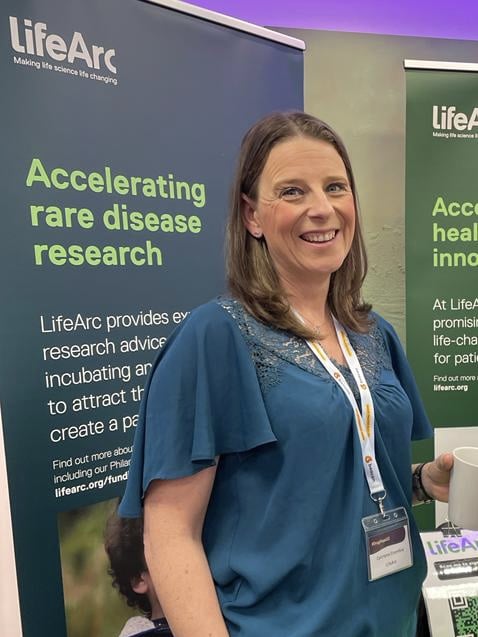LifeArc, the self-funded, non-profit medical research organisation and charity, is launching a new programme that will look to invest more than £100 million by 2030 to deliver new breakthroughs to improve the lives of people living with a rare disease.
The groundbreaking Rare Disease Translational Challenge will bring together researchers in rare disease with the expertise LifeArc can offer in translational science – bridging the gap between academic research, getting new developments to patients faster by providing funding, research and expert knowledge, all with a clear and unwavering commitment to having a positive impact on patient lives.
The Rare Disease Translational Challenge marks a great leap forward in accelerating promising early-stage research in diagnostics, treatments and the re-purposing of drugs and getting them into clinical trials faster so patients can feel the benefits sooner.
The Challenge will also look to address some of the issues people living with a rare disease face such as ending the diagnostic odyssey – the time taken to receive an accurate diagnosis – and getting access to clinical trials. This will be achieved by working in close collaboration with the rare disease research ecosystem, patients and their families, patient groups and more.
Melanie Lee, CEO of LifeArc, said: “LifeArc has been supporting rare disease research for a number of years, committing over £32 million since 2019, and I am thrilled to be launching our Rare Disease Translational Challenge today. It represents a significant step forward in our commitment to advancing rare disease research and do our best to serve the millions of individuals and families affected by these often devastating conditions.
The first commitment will be £40m for the creation of up to five Translational Rare Disease Centres across the UK. These will bring together experts in the field that specialise in different aspects of rare disease research such as new diagnostic approaches and innovative treatments. These centres can help accelerate these discoveries so that patients and families living with a rare disease benefit sooner.
The Rare Disease Translational Challenge is the latest programme launched by LifeArc that aims to deliver new medical breakthroughs in areas of healthcare that have been neglected. Other programmes include The Neurodegenerative Translational Challenge which is focusing on conditions like motor neuron disease (MND) and dementia, the Chronic Respiratory Infection Translational Challenge is aiming to improve care for people living with conditions like cystic fibrosis and the Global Health programme is targeting anti-mircobial resistance and emerging viral threats.
“Our Translational Challenges are ambitious, collaborative research programmes shaped by what patients tell us they need and designed to tackle complex health issues by taking the best scientific ideas out of the lab and helping to turn them into medical breakthroughs that can be life changing. The Rare Disease Translational Challenge will be a game-changer for people living with a rare disease”.
Karen Skinner, Chief Project and Portfolio Officer at LifeArc
Catriona Crombie, Head of Rare Disease Translational Challenge at Life Arc, said: “Through our Rare Disease Translational Challenge, we will leverage our expertise in drug discovery, diagnostics, and translational science. We will actively seek partnerships with other charities, academic institutions, industry, and patient advocacy groups, forming a network of dedicated individuals and organisations pursuing the same mission – to transform the lives of people living with a rare disease.”
Among the first projects to receive funding through the Rare Disease Translational Challenge will be a £2.5m commitment in partnership with DEBRA Austria to invite researchers aimed at re-purposing drugs to help treat the rare skin disease, Epidermolysis Bullosa (EB).
Globally, more than 300 million people are thought to live with a rare disease with approximately 3.5 million people in the UK affected, and with more than 7000 rare diseases identified, there is a clear need for new treatments and innovative technologies that can speed up diagnosis, help improve quality of life and eventually cure these diseases.
Louise Fish, Chief Executive of Genetic Alliance UK, said: “LifeArc’s investment of £40 million to establish and embed rare disease translational research centres has the potential to be life changing for the 3.5 million people in the UK living with rare conditions. We’re excited about this unique opportunity to accelerate the rate at which scientific breakthroughs in the lab can drive improvements in clinical practice and health policy.
We’re delighted by LifeArc’s commitment to support early career researchers in the UK and help them establish careers in an area where there is so much unmet need and to make sure this amazing investment focuses on the areas that matter most to people living with rare conditions.”
Dr Gail Marzetti, Director of Science, Research and Evidence at UK Department of Health and Social Care, said: “LifeArc’s significant investment in the Rare Disease Translational Challenge is a significant contribution to rare diseases research. Pioneering research is crucial for improving care and treatment for people living with rare diseases and is an underpinning theme of the UK Rare Diseases Framework.
In the 2023 England Rare Diseases Action Plan we highlighted our ongoing commitment to investment in rare disease research through the NIHR MRC Rare Disease Research Platform and renewed investment in the NIHR Biomedical Research Centres. We welcome LifeArc’s funding, which will complement our existing investments, and help further the UK’s position as world-leader in research into rare diseases for patient benefit.”
Media contact
Andrew Stewart
Director of Communications



